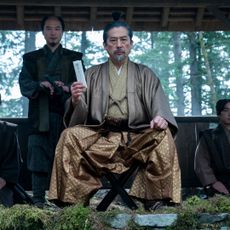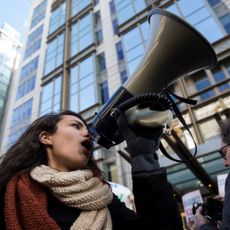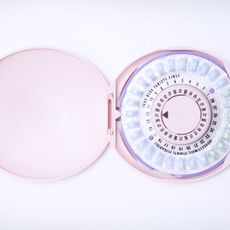In the epic 18 Days that ousted Egyptian President Hosni Mubarak earlier this year, women led the charge in turbulent uprisings across the country. Now, however, those same women say they're being sidelined in the formation of a new Egypt.
Many women argue that the Egyptian military, the country's de facto leader, has ignored them while laying the groundwork for a new government. First, the military established an all-male committee to amend the constitution to enable the country to hold elections this fall. (The elections are currently slated for September, although the date is subject to change.) In addition, the appointed transitional government has only one female minister, out of 27. And it looks unlikely that there will be a quota for women in the new parliament, as there was in the old, when about 12 percent of ministers were women.
"People say now is not the right time to fight for women's rights," says Suzi Balaban, a member of a grassroots women's group called Sawa ("together" in Arabic). "They say, 'Let's get democracy going now and talk about women later.' If not now, when?"
An example of the uphill battle for women: Amnesty International recently reported that on March 9, when the military evacuated Tahrir Square, 18 female activists were arrested, 17 of whom say they were forced to undergo "virginity tests," meaning soldiers physically probed them in a bogus test to determine if they were virgins. The military claimed the tests were done to protect the army from possible allegations of rape.
Nehad Abu El Komsan, chairwoman of the nonprofit Egyptian Center for Women's Rights, says the concept of gender equality is difficult to foster in Egypt, as many women view it as a Western import. "Women here must feel that they can be leaders," she says.
To that end, one woman, TV anchor Bothaina Kamel, announced her candidacy for president. Her chances are slim, experts say, but it's a symbolic step.
Stay In The Know
Marie Claire email subscribers get intel on fashion and beauty trends, hot-off-the-press celebrity news, and more. Sign up here.
Lauren E. Bohn is a multimedia journalist and 2010-2011 Fulbright fellow in Egypt, where she is the assistant editor of a new journal, the Cairo Review. A finalist for a 2012 Livingston Award, she's contributes to CNN, TIME, The Daily Beast, Foreign Policy, The New York Times, Salon, GlobalPost, the Christian Science Monitor, Marie Claire, Ms. Magazine, among others. She's reported from Syria, Gaza, Bahrain, Tunisia, Turkey, and the United Arab Emirates. She's a 2012 Overseas Press Foundation fellow and will be reporting with the Associated Press in Jerusalem.
-
 21 Spring Essentials in Madewell, Banana Republic, and Shopbop's Flash Sales
21 Spring Essentials in Madewell, Banana Republic, and Shopbop's Flash SalesDon’t let these can’t-miss sales pass you by.
By Brooke Knappenberger Published
-
 'Shōgun' Is a Masterpiece—Will There Be More Episodes?
'Shōgun' Is a Masterpiece—Will There Be More Episodes?With those ratings, never say never.
By Quinci LeGardye Published
-
 32 Child Stars Who Have Aged Like Fine Wine
32 Child Stars Who Have Aged Like Fine WineThey made the notoriously bumpy transition to adulthood look easy.
By Katherine J. Igoe Published
-
Decriminalizing the Sex Trade Isn't the Answer—The Equality Model Is
Legalizing prostitution legalizes pimping and sex buying, too. There is a better way.
By Alexi Ashe Meyers Published
-
 Trump Administration Tries to Make It Easier to Deny Birth Control
Trump Administration Tries to Make It Easier to Deny Birth ControlPrevious attempts were shut down by the courts.
By Cady Drell Published
-
Stormy Daniels: "I'm Not Okay With Being Made Out to Be a Liar"
The adult film star on why she's chosen to speak out about her alleged affair with Donald Trump. Stormy Daniels speaks to '60 Minutes.'
By Sally Holmes Published
-
 Survivors of Sexual Assault Shouldn't *Have* to Speak Out
Survivors of Sexual Assault Shouldn't *Have* to Speak OutMy story, like my body, belongs to me—but people expect me to share every detail.
By Caroline Rothstein Published
-
 Seriously, Why Do Conservatives Hate Birth Control?
Seriously, Why Do Conservatives Hate Birth Control?Spoiler alert: It's not about women's health or safety.
By Jessica Valenti Published
-
 One Thing Is Clear: We *Must* End the Statute of Limitations on Sex Crimes
One Thing Is Clear: We *Must* End the Statute of Limitations on Sex CrimesIt takes many victims a lifetime to report—but that doesn't mean their attackers should be let off the hook.
By Jill Filipovic Published
-
How a Normal Rhode Island Girl Got Sold into Sex Trafficking
So many Americans think sex trafficking is a heinous practice that happens somewhere else. Here, undeniable proof of its human toll right here in our own backyard.
By Maxine Joselow Published
-
 Two Powerhouse Politicians on What the Fight Against Zika Really Needs
Two Powerhouse Politicians on What the Fight Against Zika Really NeedsDemocratic National Committee Chair Debbie Wasserman Schultz and Congresswoman Norma Torres make the case for birth control—everywhere.
By Debbie Wasserman Schultz Published